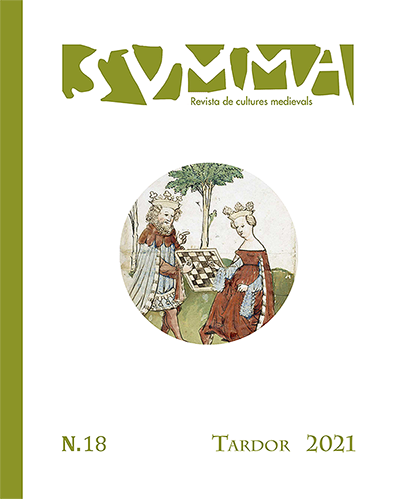Arnau de Vilanova’s Interpretation of Augustine of Hippo’s Eschatology in the Antidotum contra venenum effusum per fratrem Martinum de Atheca
DOI:
https://doi.org/10.1344/Svmma2021.18.5Palabras clave:
Arnold of Villanova, Martin of Ateca, AntidotumResumen
In the apocalyptic controversy that set Arnald of Vilanova at odds with professional theologians during the early years of the 14th century, the interpretation of Augustine of Hippo’s texts concerning the possibility of acquiring advance knowledge of the end times played a very significant role. The aim of this article is to analyze this controversy in the final polemical work written by Arnald – in other words, the unpublished Antidotum contra venenum effusum per fratrem Martinum de Atheca. Both Arnald and his opponent Martin of Ateca found supporting arguments for their own positions within Augustine’s oeuvre, yet underlying this controversy was a further question: Under what authority did Arnald of Villanova issue his prediction? If this prediction was ther outcome of a revelation, as the Catalan thinker contended, the Augustinian texts would seem to come down on Master Arnald’s side; if it consisted in mere speculation on Arnald’s part, however, as Martin of Ateca claimed, Augustine of Hippo had already ruled out any attempt of this kind.
Descargas
Publicado
Número
Sección
Licencia
Los autores que publican en esta revista están de acuerdo con los siguientes términos:
a. Los autores conservan los derechos de autoría y otorgan a la revista el derecho de primera publicación de la obra. SVMMA Revista de Culturas Medievales publica con una licencia de Reconocimiento-NoComercial-CompartirIgual 3.0 España de Creative Commons, la cual permite compartir la obra con terceros, siempre que éstos reconozcan su autoría, sin ánimo de lucro y compartan la obra derivada en las mismas condiciones.
b. Los autores son libres de hacer acuerdos contractuales adicionales independientes para la distribución no exclusiva de la versión de la obra publicada en la revista (como la publicación en un repositorio institucional o en un libro), siempre que se reconozca su publicación inicial en esta revista.
c. Se anima a los autores a publicar su obra en línea (en repositorios institucionales o en su página web, por ejemplo), con el objetivo de conseguir intercambios productivos y hacer que la obra obtenga más citaciones (véase The Effect of Open Access, en inglés).





